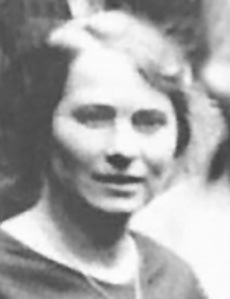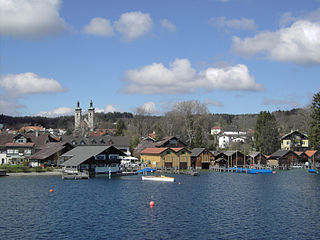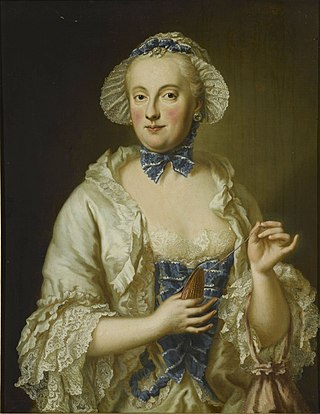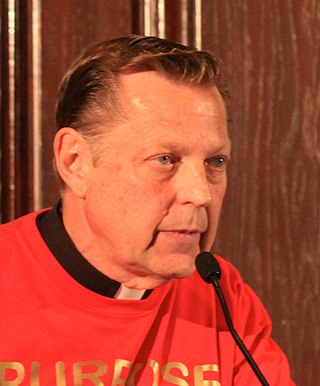Sabina of Bavaria may refer to:
- Sabina of Bavaria, Duchess of Württemberg (1492–1564)
- Sabina of Palatinate-Simmern (1528–1578)
Sabina of Bavaria may refer to:

Bavaria, officially the Free State of Bavaria, is a state in the southeast of Germany. With an area of 70,550.19 km2 (27,239.58 sq mi), it is the largest German state by land area, comprising roughly a fifth of the total land area of Germany, and with over 13.08 million inhabitants, it is the second most populous German state, behind only North Rhine-Westphalia; however, due to its large land area, its population density is below the German average. Major cities include Munich, Nuremberg, and Augsburg.
Bavarian is the adjective form of the German state of Bavaria, and refers to people of ancestry from Bavaria.

Oud-Beijerland is a town and former municipality in the western Netherlands, in the province of South Holland, now a part of the Hoeksche Waard municipality. With a population of 24,575 in 2020, it is the most populous town of the Hoeksche Waard island. The town is located adjacent to the confluence of the Oude Maas and Spui River.

The Basilica of Saint Sabina is a historic church on the Aventine Hill in Rome, Italy. It is a titular minor basilica and mother church of the Roman Catholic Order of Preachers, better known as the Dominicans.

Joaquín Ramón Martínez Sabina is a Spanish musician, singer, composer, and poet. His songs usually treat love, heartbreaks and society with significant use of literary figures as in the baroque-literature style.

Sabina Nikolayevna Spielrein was a Russian physician and one of the first female psychoanalysts. She was in succession the patient, then student, then colleague of Carl Gustav Jung, with whom she had an intimate relationship during 1908–1910, as is documented in their correspondence from the time and her diaries. She also met, corresponded, and had a collegial relationship with Sigmund Freud. She worked with and psychoanalysed Swiss developmental psychologist Jean Piaget. She worked as a psychiatrist, psychoanalyst, teacher and paediatrician in Switzerland and Russia. In a thirty-year professional career, she published over 35 papers in three languages, covering psychoanalysis, developmental psychology, psycholinguistics and educational psychology. Among her works in the field of psychoanalysis is the essay titled "Destruction as the Cause of Coming Into Being", written in German in 1912.

Albert IV was Duke of Bavaria-Munich from 1467, and duke of the reunited Bavaria from 1503.

Kunigunde of Austria, a member of the House of Habsburg, was Duchess of Bavaria from 1487 to 1508, by her marriage to the Wittelsbach duke Albert IV.

Sabina of Bavaria-Munich was Duchess consort of Württemberg by marriage to Ulrich, Duke of Württemberg.
Conrad of Wittelsbach was the Archbishop of Mainz and Archchancellor of Germany from 20 June 1161 to 1165 and again from 1183 to his death. He was also a cardinal of the Roman Catholic Church.
Sabina may refer to:

Tutzing is a municipality in the district of Starnberg in Bavaria, Germany, on the west bank of the Starnberger See. Just 40 km south-west of Munich and with good views of the Alps, the town was traditionally a favourite holiday spot for those living in the city.

Maria Anna Sophia of Saxony was a daughter of King Augustus III of Poland and his wife Maria Josepha of Austria who became Electress of Bavaria by marriage to Maximilian III Joseph, Elector of Bavaria.

Michael Louis Pfleger is an American Catholic priest and social activist located in Chicago. Since 1981, he has been pastor of St. Sabina Catholic Church, a Black parish in Chicago's Auburn Gresham neighborhood.

Sabina, Duchess of Bavaria was the daughter of John II, Count Palatine of Simmern and Beatrix of Baden.
Santa Sabina may refer to :
Free Voters is a political party in Germany. It originates as an umbrella organisation of several Free Voters Associations, associations of people which participate in an election without having the status of a registered party. These associations are usually locally-organised groups of voters in the form of a registered association (eV). In most cases, Free Voters campaign only at local government level, standing for city councils and for mayoralties. Free Voters tend to achieve their most successful electoral results in rural areas of southern Germany, appealing most to conservative voters who prefer local decisions to party politics. Free Voter groups are active in all of the states of Germany.
Sainte-Sabine is a commune in the Côte-d'Or department in eastern France.

Sabina Margrit Sciubba or Sabina is a singer, composer, performance artist and actress. She became known as the lead singer for the Grammy-nominated electronica band Brazilian Girls. She is also a visual artist. She has a solo career, and also worked as an actress, appearing in a recurring role on the FX series Baskets, beginning in 2016. Sciubba has composed the scores for feature films and commercials.

Johann Casimir von Haeffelin was a Roman Catholic priest in the diocese of Speyer, a cardinal and a major diplomat during the reign of Maximilian I Joseph of Bavaria. As Bavaria's ambassador to the Holy See he negotiated the Concordat of 24 October 1817 between the Kingdom of Bavaria and the Catholic Church under pope Pius VII. He was made titular bishop of Chersonesus on Crete on 28 September 1817 by Pius VII and consecrated in the Maltheserkirche St. Michael in Munich on 11 November that year by the apostolic nuncio Giulio Cesare Zoglio. In the consistory of 6 April 1818 Pius VII also made him a cardinal, with his title being Santa Sabina and then from 1822 Sant'Anastasia - as such he took part in the conclave of 1823 which selected pope Leo XII.